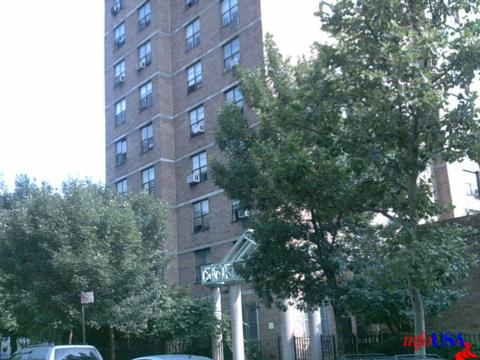BY SAM SPOKONY | In an attempt to generate millions of dollars in revenue desperately needed to fill a budget gap and fund more than 400,000 stalled building repair orders, the New York City Housing Authority plans to lease land within some of its Manhattan developments to private developers, who would be able to build luxury apartments on those lots.
Five of the potential lease sites are in the East Village and Lower East Side, according to sources who have been briefed on the plans.
Those sites include parking lots and/or recreational areas within Campos Plaza, Baruch Houses, Smith Houses, LaGuardia Houses and Meltzer Tower (a building exclusively for senior citizens).
NYCHA bluntly ignored this newspaper’s request for more — or even any — specific details on the plans, instead sending a statement saying that strategies like this leasing idea are “vital to improving the circumstances of NYCHA’s residents and buildings.”
But according to “internal documents” obtained by the Daily News and published on Wednesday, the authority’s entire eight-development scheme would allow private developers to build around 3 million square feet of new housing, including more than 1 million square feet within Smith Houses and around 175,000 square feet within Baruch Houses.
NYCHA will offer 99-year leases on all the sites, according to sources, and currently expects 80 percent of the new housing to be market rate, with the other 20 percent being affordable housing. No current residents would be displaced.
Sources who have been briefed on the scheme also said that NYCHA plans to release its requests for proposal (R.F.P.s) to private developers by mid-March — a little more than a month from now.
NYCHA Chairperson John Rhea originally announced the plan last fall, without providing any specific details about whom it would affect.
The authority’s action in this case does not require approval under the city’s Uniform Land Use Review Procedure (ULURP). Notably, this means that community boards and the City Council will play no formal role in approving the lease plan.
Instead, the scheme requires authorization by the U.S. Department of Housing and Urban Development, under Section 18 of the Housing Act of 1937.
Section 18 approval, however, does require there to be “resident consultation” regarding the overall plan, according to the text of the Housing Act, and NYCHA will have to include a “description of the manner in which resident consultation was accomplished” when submitting its application to HUD.
While NYCHA representatives have already spoken with tenant leaders of the affected developments, as well as area elected officials, about the lease plan, direct consultation with the more than 10,000 combined residents of Campos, Baruch, Smith, Laguardia and Meltzer has not yet occurred.
State Assemblymember Brian Kavanagh told this newspaper that at an Assembly hearing last week, NYCHA’s leadership claimed it will in fact hold a public forum in the near future that will allow all potentially affected residents to learn about and weigh in on the details of the plan.
“During their testimony, they made a firm commitment that there will be a public meeting at which everybody will be able to see what’s happening,” Kavanagh said.
To that end, he stressed that the Assembly is currently prepared to do “whatever is necessary” to make sure that residents’ concerns are legitimately taken into account, adding that the Assembly has considered the possibility of new legislation that would impose state-level restrictions on this process.
“We’re very open to hearing what NYCHA is proposing — and we’re certainly not at this point yet — but if NYCHA doesn’t work with us on this, we could just flat-out oppose the plans whenever we have the opportunity to make our feelings known,” Kavanagh said.
And in a statement sent to this newspaper on Wednesday, Assembly Speaker Sheldon Silver directly called upon the housing authority to take the issue of resident consultation seriously.
“I am very concerned about the possibility of NYCHA residents losing critical amenities such as playgrounds, recreational areas and parking lots,” Silver said. “NYCHA needs to address the concerns expressed by its tenants, and it must work collaboratively with residents, tenant leadership and our entire community.”
At this point, concerns with NYCHA’s lease plan — among not just residents, but also other area elected officials and Community Board 3 — are numerous, and, in some cases, vehement.
After hearing heaps of negative feedback from tenant leaders, residents and representatives of community organizations, the C.B. 3 Land Use Committee voted on Tuesday night to draft a letter to NYCHA, asking the housing authority to not send out R.F.P.s until more “meaningful” community outreach has taken place.
City Councilmember Margaret Chin said she’s also concerned about a lack of outreach, as well as the proposed 20-percent figure on affordable housing for the new buildings, adding that she believes that number is “simply not enough.”
“I understand NYCHA’s capital needs and I want to be supportive of efforts to try and raise revenue, but I have serious concerns,” Chin said. “It’s all going to depend on what we can negotiate. I’m not sold yet.”
And at the C.B. 3 committee meeting, Aixa Torres, Smith Houses Tenant Association president — alongside a dozen of her residents — condemned NYCHA’s lease plan in a diatribe of sheer fury. She explained that she completely opposes any new building within the development, and instead wants the housing authority to conduct long-overdue repairs to boilers that have caused numerous gas outages over the past year.
“It’s a travesty, that NYCHA thinks they can just build on top of our community rather than doing the right thing and fixing up our buildings, as if we don’t have families, as if we’re not human beings,” Torres said, who later added that NYCHA never reached out to the nearly 2,000 residents of her complex about the plans. “They think we’re just pieces of paper, and that our homes are just pieces of property. They think we don’t have a voice, but we do. I guarantee you that we’ll be knocking on every door.”
In the statement it sent to this newspaper, NYCHA said that, since announcing the lease plan last fall, it has “closely engaged” with residents, community leaders and elected officials.
“We look forward to continuing that outreach,” NYCHA said.
However, when this reporter spoke to Torres over the phone on Wednesday, she responded by saying that the housing authority’s leadership should, instead, “just go and jump in the river.”

































